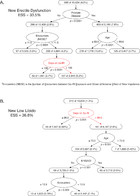marcelomccart
About marcelomccart
Observational Research on the Treatment of Consuming Disorders: Patterns, Challenges, And Outcomes

Eating disorders (EDs) are complex mental well being situations that can have severe physical and psychological penalties. They are characterized by abnormal eating habits and a preoccupation with physique weight and shape. The treatment of eating disorders is multifaceted and requires a complete understanding of the varied approaches that can be taken to deal with the needs of affected individuals. This observational research article goals to explore the present landscape of consuming disorder treatment, highlighting patterns, challenges, and outcomes primarily based on observational knowledge.
Patterns of Treatment Approaches
The treatment of consuming disorders sometimes entails a mixture of medical, psychological, and nutritional interventions. Observational studies point out that the most commonly used treatment modalities embody cognitive-behavioral therapy (CBT), household-based therapy (FBT), and pharmacotherapy. Each of those approaches has its own set of strengths and limitations.
Cognitive-behavioral therapy has emerged as one in every of the simplest treatments for bulimia nervosa and binge eating disorder. Observational data show that CBT helps patients establish and alter distorted ideas and behaviors related to food and physique picture. Research indicate that patients undergoing CBT expertise vital reductions in binge-eating episodes and enhancements in general psychological nicely-being.
Household-based therapy is especially effective for adolescents with anorexia nervosa. Observational research highlights the importance of involving relations within the treatment course of, as it fosters a supportive surroundings that encourages restoration. FBT empowers mother and father to take an energetic role in their child’s restoration, which may lead to better outcomes. However, it is crucial to acknowledge that not all families are equipped to participate meaningfully in one of these therapy, which can limit its applicability.
Pharmacotherapy, together with the usage of antidepressants and antipsychotic medications, can be utilized in the treatment of consuming disorders, notably when co-occurring psychological well being points are present. Observational research have proven that medications can assist alleviate symptoms of depression and anxiety, which may contribute to the maintenance of disordered eating behaviors. Nonetheless, the effectiveness of pharmacotherapy can range considerably among people, and it is often used at the side of psychotherapy.
Challenges in Treatment
Regardless of the availability of assorted treatment modalities, a number of challenges persist within the effective treatment of consuming disorders. One vital barrier is the stigma associated with these situations, which may deter individuals from seeking help. Observational research signifies that many individuals with consuming disorders may delay looking for treatment resulting from emotions of shame or worry of judgment. This delay can exacerbate the severity of the disorder and complicate treatment efforts.
Another challenge is the accessibility of treatment. Many individuals with consuming disorders wouldn’t have entry to specialized care as a result of geographic, monetary, or insurance coverage-related boundaries. In the event you loved this article and you want to receive more details with regards to erectile dysfunction treatment pill kindly visit our own internet site. Observational information recommend that people living in rural areas are significantly disadvantaged, as they might have limited entry to psychological well being professionals educated in consuming disorder treatment. This lack of entry can result in prolonged suffering and increased threat of complications.
Moreover, treatment adherence poses a big challenge. Observational studies reveal that many patients battle to adhere to treatment suggestions, which may hinder restoration. Elements reminiscent of lack of motivation, fear of weight achieve, and co-occurring psychological health circumstances can contribute to poor adherence. It’s essential for treatment suppliers to handle these obstacles and develop individualized treatment plans that consider the distinctive wants and circumstances of each patient.
Outcomes of Treatment
The outcomes of consuming disorder treatment can range widely based on several factors, together with the type of disorder, the duration of the illness, and the treatment approach used. Observational analysis signifies that early intervention is associated with more favorable outcomes. Individuals who obtain treatment at the onset of their consuming disorder are extra seemingly to realize full recovery compared to those who delay looking for assist.
For these with anorexia nervosa, long-term outcomes will be particularly challenging. Observational studies present that whereas many people expertise weight restoration and improvements in psychological symptoms, a big proportion could proceed to battle with body picture issues and disordered eating behaviors even after treatment. This underscores the need for ongoing assist and comply with-up care to advertise lasting restoration.
In contrast, individuals with binge eating disorder and bulimia nervosa are inclined to have better treatment outcomes, particularly when treated with evidence-based mostly therapies akin to CBT. Observational data recommend that many patients expertise important reductions in binge-consuming episodes and improvements in overall high quality of life following treatment.

Conclusion
The treatment of eating disorders is a fancy and evolving area that requires a nuanced understanding of assorted therapeutic approaches, challenges, and outcomes. Observational analysis highlights the effectiveness of cognitive-behavioral therapy, household-based therapy, and pharmacotherapy in addressing the wants of people with consuming disorders. Nonetheless, barriers comparable to stigma, accessibility, and treatment adherence proceed to pose important challenges in the efficient management of these situations.
To improve treatment outcomes, it is essential to promote awareness and understanding of consuming disorders, reduce stigma, and enhance access to specialised care. Ongoing analysis and observational research will play a vital position in identifying best practices and informing future treatment strategies. Finally, a comprehensive and individualized strategy to treatment can help individuals with consuming disorders achieve lasting restoration and improved quality of life.
No listing found.

